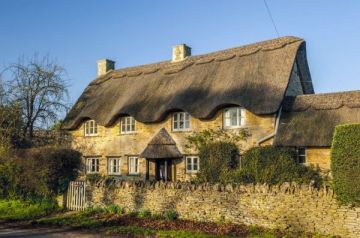It is in the Saxon period that Oxford begins to assume an importance missing from its Roman past. A Saxon abbey was established where Christ Church now stands, and the abbess was St. Frideswide, a Mercian princess.
The story goes that St. Frideswide built the abbey as a means to preserve her virginity. When a persistent suitor tried to take the abbey (and the abbess) by force, he was struck blind. Only when the saintly Frideswide forgave him was the unfortunate man's sight restored. St. Frideswide is now the patron saint of the city of Oxford.
St. Frideswide's abbey burnt to the ground in 1002. The Danish population of Oxford were blamed for the burning, and large numbers were massacred. The abbey was later rebuilt as an Augustinian priory. The cemetery of the priory has now been excavated in Christ Church Meadow.
Oxford's growth during the late Saxon period owed much to its position on a major trade route between the powerful Saxon kingdoms of Mercia and Wessex. It owed more still, to one man -- King Alfred.
Alfred the Great's Oxford
Alfred the Great was king of Wessex, and he led the Saxon resistance to the onslaught of Danish Viking invaders. Legends persist that Alfred was personally responsible for founding Oxford University. Given Alfred's unusual (for his time) interest in scholarship, this legend is not as unlikely as it may seem.
Coins have been found from the reign of King Alfred which bear the mark "Ohsnafordia", which may indicate the presence of a royal mint at Oxford.
Certainly, Alfred was responsible for the Saxon system of "burhs", or fortified towns, built to keep the Danes at bay. Oxford became a burh in 911, under royal protection, and its growth and importance accelerated.
The uncertain reign of Ethelred the Unready saw the city sacked by the Danes in 1009 in retribution for the massacre of 1002. Just 4 years later Oxford was forced to submit to a fresh Danish force under Swein Forkbeard. The growing importance of Oxford is indicated by the fact that Canute chose the city as the scene of his coronation in 1018.
Oxford History
Origins ~ Saxon ~ Medieval ~ Tudor and Civil War ~ Town & Gown


